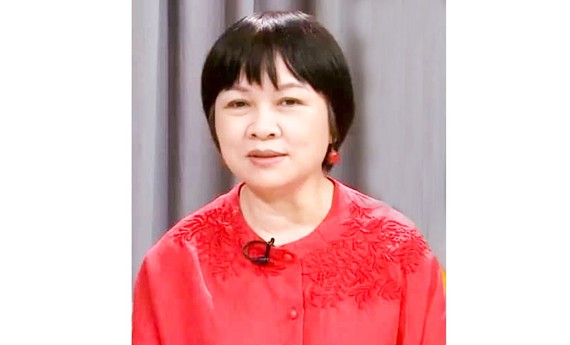 Opinion
Opinion


|
| Dr Khuất Thu Hồng, head of the Institute of Social Development Studies. Photo sggp.org.vn |
Dr Khuất Thu Hồng, head of the Institute of Social Development Studies (ISDS), talks with Sài Gòn Giải Phóng (Liberated Sài Gòn) newspaper about the position of women in society today
Could you talk about Vietnamese women’s position in society?
If we look at statistics, Việt Nam ranks sixth among countries with the highest women business ownership; the average life expectancy for females in Việt Nam is 76.3 years old (while the figure for the world is 72 years old); the proportion of females elected to the National Assembly of Việt Nam reaches 27.1 per cent, higher than the average rate of the globe (23.4 per cent) and of Asia (18.6 per cent), it can be seen that Vietnamese women have made long development steps in improving their position in society.
We also see that women make up nearly half of the national labour force and the rate of female students is equal or even higher than male students at some education levels.
Each day we can see the appearance of new faces of those women who succeed in all areas, including society and the economy.
However, these achievements remain modest in comparison with the potential of Vietnamese women.
Does this mean that efforts to improve women’s position in Việt Nam still fail to meet expectations?
To be fair, gender equality has just been improved among a small number of women in urban areas who have a high education level and good incomes.
At family or in society, women still have to stand behind men. Looking at workshops discussing important national issues, we can see that the rate of female participants is not high enough to represent half of the country’s population. Looking at the streets, we still can see women who are worried about how to pick up children from school on time and have time to go to the market to buy food for the family. Looking at many houses, we can find very few men who return home after work to help with the housework.
In rural areas, the life of women is much harder.
Why have many policies, programmes and projects about gender equality been implemented over years but the achievements remain limited?
As mentioned above, gender equality in Việt Nam has made positive changes, but there is still a long way to go.
Society in general still values men more than women but forgets to know that while men focus on developing their career, women, apart from their career, still have to take care of the family and do housework - an unpaid job that is not highly appreciated. If women speak up, they will be labelled as feminist. Many women do not want to speak up as they worry that the “crown” of gender stereotype will be tightened.
You have mentioned the term feminist. How should we understand this?
Many people do not understand the meaning of feminist correctly. In their mindset, those fighting for feminism are those always calling for women’s interests, regardless of whether these interests are reasonable or not. Some people also misunderstand that feminism supports a lifestyle with no need to do housework, not get married, not give birth or eat and talk like men. This understanding is not correct and will make people dislike feminism and find ways to oppose it.
Feminism does not negate men or femininity. In contrast, feminism encourages the consideration of women’s viewpoints in all life issues, particularly women’s issues so women can work with men to design a society that can meet the demands of both men and women and create conditions for both genders to promote their capacity.
What should we do to address the root causes of gender inequality?
I have recently seen encouraging changes among the young generation. However, to have sustainable changes, we must eradicate stereotypes about women’s capacity and change gender stereotypes that bind women to housework. Social institutions such as schools, families, organisations and communications need to play an important role in education to form correct perceptions of gender equality.
Social policies should acknowledge women’s contributions and create conditions to reduce the housework burden for women and encourage men to share this role with women.
Society should be gradually redesigned so that both men and women are able to uphold their capacity and share responsibility for taking care of children and old people. — VNS